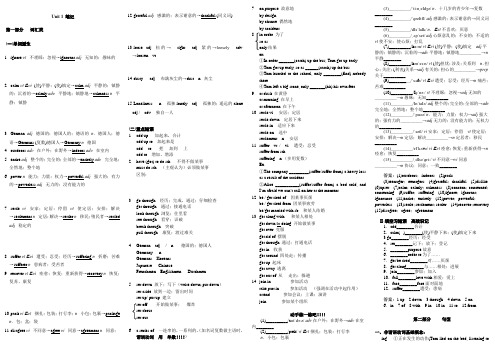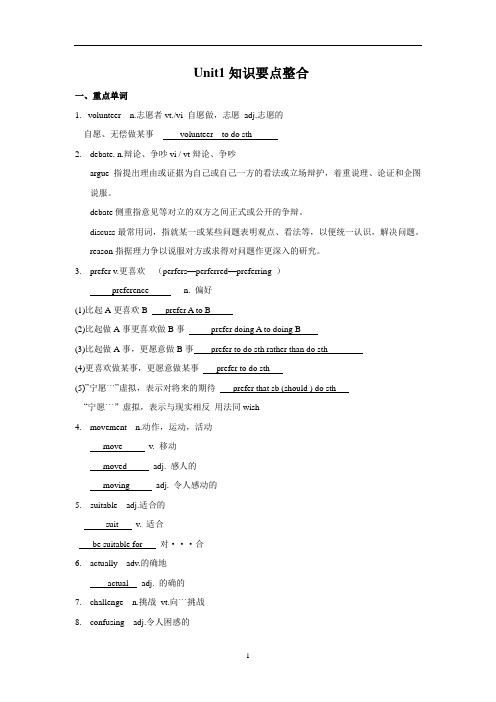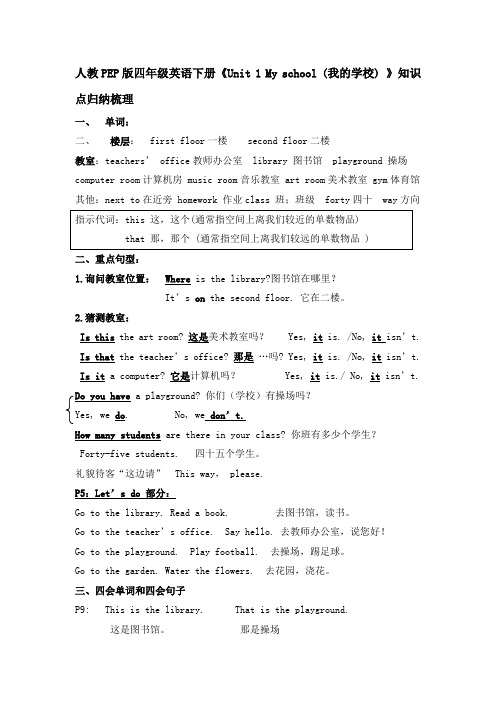Unit1知识点归纳
高中英语必修一 unit 1知识点笔记及练习

Unit 1 笔记第一部分词汇类(一)单词派生1.ignore v t. 不理睬;忽视→ignorant adj. 无知的;愚昧的2.calm v t.&v i. (使)平静;(使)镇定→calm adj. 平静的;镇静的;沉着的→calmly ad v. 平静地;镇静地→calmness n. 平静;镇静3.German adj. 德国的;德国人的;德语的n.德国人;德语→Germans (复数)德国人→Germany n. 德国4.outdoors ad v. 在户外;在野外→indoors ad v. 在室内5.entire adj. 整个的;完全的;全部的→entirely ad v. 完全地;全然地;整个地6.power n. 能力;力量;权力→powerful adj. 强大的;有力的→powerless adj. 无力的;没有能力的7.settle v i. 安家;定居;停留v t. 使定居;安排;解决→settlement n. 定居;解决→settler n. 移民;殖民者→settled adj. 稳定的8.suffer v t.&v i. 遭受;忍受;经历→suffering n. 折磨;苦难→sufferer n. 患病者;受苦者9.recover v t.&v i. 痊愈;恢复;重新获得→recovery n. 恢复;复苏,康复10.pack v i.&v t. 捆扎;包装;打行李;n. 小包;包裹→packagen.包;盒;袋11.disagree v i. 不同意→agree v i. 同意→agreement n. 同意;12.grateful adj. 感激的;表示谢意的→thankful (同义词)13.loose adj. 松的→tight adj. 紧的→loosely adv.→loosen vt.14.dusty adj. 布满灰尘的→dust n. 灰尘15.Loneliness n. 孤独lonely adj. 孤独的;遥远的aloneadj./ adv. 独自一人(二)重点短语1.add up 加起来,合计add up to 加起来是add.... to... 把.....加到.....上add to 增加,增添2.have (got) to do sth 不得不做某事must do sth (主观认为)必须做某事区别:3.go through 经历;完成,通过;仔细检查get through 通过;接通电话look through 浏览;往里看see through 看穿;识破break through 突破pull through 康复;渡过难关4.German adj. / n. 德国的;德国人Germany n.Germans KoreansJapanese ChineseFrenchmen Englishmen Dutchmen5.set down 放下;写下(write down; put down)set aside 放到一边;留出时间set up/ put up 建立set off 开始做某事;爆炸set aboutset out6. a series of 一连串的,一系列的。
高中英语 人教版必修一unit1 知识要点整合

Unit1知识要点整合一、重点单词1.volunteer n.志愿者vt./vi 自愿做,志愿adj.志愿的自愿、无偿做某事volunteer to do sth2.debate. n.辩论、争吵vi / vt辩论、争吵argue指提出理由或证据为自己或自己一方的看法或立场辩护,着重说理、论证和企图说服。
debate侧重指意见等对立的双方之间正式或公开的争辩。
discuss最常用词,指就某一或某些问题表明观点、看法等,以便统一认识,解决问题。
reason指据理力争以说服对方或求得对问题作更深入的研究。
3.prefer v.更喜欢(perfers—perferred—preferring )preference n. 偏好(1)比起A更喜欢B prefer A to B(2)比起做A事更喜欢做B事prefer doing A to doing B(3)比起做A事,更愿意做B事prefer to do sth rather than do sth(4)更喜欢做某事,更愿意做某事prefer to do sth(5)”宁愿```”虚拟,表示对将来的期待prefer that sb (should ) do sth“宁愿```”虚拟,表示与现实相反用法同wish4.movement n.动作,运动,活动move v. 移动moved adj. 感人的moving adj. 令人感动的5. suitable adj.适合的suit v. 适合be suitable for 对···合6.actually adv.的确地actual adj. 的确的7.challenge n.挑战vt.向```挑战8.confusing adj.令人困惑的confused adj.感动困惑的confuse v.使···困惑confusion n..困惑8. fluent adj.流利的fluency n.流利;(1)在```很流利be fluent in9.graduate v.毕业n.毕业生graduation n.毕业(1)从```毕业__graduate from10. recommend v. 建议recommendation n.建议(1)向某人推荐、介绍``` recommend sth to/with sb(2)推荐某人做``` recommend sb for ```(3)推荐某人为``` recommend sb as ```(4)推荐某物做``` recommend sth for ```(5)建议做``` recommend doing ```(6)建议某人做``` recommend sb to do ```(7)建议``` recommend that sb (should ) do ```“一坚持,二命令,三建议,四要求”---insist/order/command/advise/suggest/recommend/ask/require/request/demand 11.advance n.进步v. 推动advanced adj.先进的,高级的in advance 事先,提前in advance of 在……前面,超过,比……进步on the advance 在上涨12.obviously adv.显然地obvious adj.显然的13. responsible adj.有责任的responsiblity n. 责任(1)对```负责___be responsible for_____14. editor n.编辑edit v.编辑15.schedule n. 工作计划,日程安排v.安排,预定(1)按时__on schedule(2)提前__ahead of schedule16.expert vi担任专家;n.专家adj.熟练的,内行的(1)在```上很内行__be expert in /be an expert in 17. behavior n.行为、动作behave v.行为17.attract v.吸引attraction n.吸引力attractive adj.有吸引力的(1吸引至```___attract to(2)吸引注意力___attract one’s attention19. addict vt. 使上瘾n.瘾君子addiction n. 上瘾addictive adj. 使人上瘾的addicted n. 上瘾的(1)对``上瘾be addicted to _20. wealth n. 财富wealthy adj. 富有的二、重点短语1. enjoy doing 喜欢做某事2. make all the difference 改变一切,大不相同3. clean up 打扫4.sign up签约sign up for 报名参加、注册5.on one’own 独自6.hand out 分发7. in the community 在社区中8. be used to doing sth 习惯于做某事9.keep up with追赶10. be prepared for 准备好```11. do well in 在```做得好12. try out for 参加```的选拔13.practice doing 练习做某事14. make the team 组队15. make a fire 生火16. learn sth from sb向某人学习```17. give a speech 做演讲18. get started 开始19. have fun 玩得开心20. focus on 集中注意力在21. encourage sb to do sth 鼓励某人做某事22. feel lonely 感到孤独23. in a good order 井然有序地24. quit doing 放弃做某事25. work out 算出,解答出26. drop out of school 辍学27. be grateful to sb for sth 对某人做某事表示感激28. be pleased to do sth 很高兴做某事29. introduce sb to sb 把某人介绍给某人30. aim to 目的在31. be the same as 和```一样32. be similar to 和```相似33. agree with sb/sth 同意某人/某事三、重点句型1. since 因为I am sure he will listen to you, since you are his good friend.2.be+adj+to dothe handwriting is easy to read.。
Unit1 Hello!知识点归纳

Unit1 Hello! 知识点归纳二、单词1.morning 早晨;上午2.afternoon 下午3.evening 晚上4. night 夜晚5.hi 你好6.hello 你好7.I 我8.am 是9.class 同学们10.good 好的11. dear 亲爱的12.Miss小姐13.Mr 先生14. Mrs 夫人,太太三、人物1.Mike 迈克2.Su Hai 苏海3.Yang Ling 杨玲4.Liu Tao 刘涛5.Sam 山姆6.Bobby 波比四、句子1. Good morning, Sam.山姆,早上好。
Good morning, Bobby. 波比,早上好。
2. Good afternoon, class.同学们,下午好。
Good afternoon, Miss Li. 李老师,下午好。
3. Hi, Yang Ling. 杨玲,你好。
Hi, Liu Tao. 刘涛,你好。
4. Hello, class. 同学们,大家好。
Hello, Mr Zhang.张老师,你好。
五、复习巩固:一年级上册Unit1 I’m Liu Tao Unit2 Good morning!Hello. I’m Liu Tao. 你好。
我是刘涛。
Good evening!晚上好!Good night!晚安!六、知识拓展1. 拓展词汇:classroom教室classmate 同班同学2. 英语礼貌用语多,根据情景来选择。
Hello! Hi! 是“你好!”,见面问好常用到。
Goodbye! 是“再见!”,Good night! 道“晚安!”。
同学多日不见面,相见问好“How are you?”。
答语常用“I'm fine. Thank you.”。
初次认识新朋友,握手问好“Nice to meet you.”。
打扰别人问问题,开口先说“Excuse me.”。
别人关心帮助你,感谢用语“Thank you.”。
人教版七年级英语下册Unit1 - 知识点归纳

Unit1 Can you play the guitar?知识点归纳一、重点短语1. ___________下国际象棋2. ______________ 弹吉他3. ______________ 说英语4. ______________ 英语俱乐部5. ______________ 跟…说6. ______________ 拉小提琴7. ______________ 弹钢琴8. ______________敲鼓9. ______________ 结交朋友10. ______________ 练(中国) 功夫11. ______________ 讲故事12. ______________ 做游戏13. ______________ 在周末二、用法归纳1. play +棋类/球类下…棋/打…球2. play the +西洋乐器弹/拉…乐器3. be good at doing sth.= do well in doing sth. 擅长做某事4. be good with sb. 和某人相处地好5. need sb. to do sth. 需要某人做某事6. can + 动词原形能/会做某事7. a little + 不可数名词一点儿…8. join the…club 加入…俱乐部9. like to do sth. =love to do sth. 喜欢/喜爱做某事三、重点句子1. —____________________________你会画画吗?—____________________________ 是的,我会。
/不,我不会。
2. —____________________________ 你想加入哪个俱乐部?—____________________________ 我想加入国际象棋俱乐部。
3. ____________________________ 你可以加入英语俱乐部。
4. ____________________________ 听上去很好。
unit1知识点

unit1知识点
以下是Unit 1的知识点:
1. 问候和自我介绍:
- 问候的常用表达:Hello, hi, good morning/afternoon/evening, how are you?
- 自我介绍的常用句型:My name is xxx. I am xx years old. I come from xxx.
2. 介绍家庭成员:
- 家庭成员的称呼:father, mother, brother, sister, grandparents, etc.
- 介绍家庭成员的常用句型:This is my father/mother/brother/sister. His/Her name is xxx.
3. 询问和回答个人信息:
- 询问名字:What's your name?/What's your full name?
- 询问年龄:How old are you?
- 询问国籍:Where are you from?
- 回答个人信息的常用句型:My name is xxx. I am xx years old. I come from xxx.
4. 简单的日常用语:
- 感谢:Thank you. Thanks a lot.
- 道歉:I'm sorry. I apologize.
- 请问:Excuse me, can I ask you a question?
5. 时态:
- 一般现在时:表述经常发生的事情、事实和真理。
- 现在进行时:表示现在正在进行或发生的动作。
这些是Unit 1的主要知识点,希望对你有帮助!。
人教PEP版四年级英语下册《Unit 1 My school (我的学校) 》知识点归纳梳理

人教PEP版四年级英语下册《Unit 1 My school (我的学校) 》知识点归纳梳理一、单词:二、楼层: first floor一楼 second floor二楼教室:teachers’ office教师办公室 library 图书馆 playground 操场computer room计算机房 music room音乐教室 art room美术教室 gym体育馆其他:next to在近旁 homework 作业class 班;班级 forty四十 way方向二、重点句型:1.询问教室位置: Where is the library?图书馆在哪里?It’s on the second floor. 它在二楼。
2.猜测教室:Is this the art room? 这是美术教室吗? Yes, it is. /No, it isn’t. Is that the teacher’s office? 那是…吗? Yes, it is. /No, it isn’t. Is it a computer? 它是计算机吗? Yes, it is./ No, it isn’t.你们(学校)有操场吗?. No, we don’t.How many students are there in your class? 你班有多少个学生?Forty-five students. 四十五个学生。
礼貌待客“这边请” This way, please.P5:Let’s do 部分:Go to the library. Read a book. 去图书馆,读书。
Go to the teacher’s office. Say hello. 去教师办公室,说您好!Go to the playground. Play football. 去操场,踢足球。
Go to the garden. Water the flowers. 去花园,浇花。
人教版九年级英语Unit1知识点总结

Unit1 How can we become good learners?一、语法点:介词by的用法1. by doing sth. 通过做某事的方式eg: —How can you improve your pronunciation? —By listening to tapes.2. 表示传达、传递的方式或媒介eg:How did you tell him about it, by letter or by e-mail?3. by + 交通工具eg: Every day I go to school by school bus.4. 在……的旁边eg: I’m sitting by the lake.5. 不迟于、在…之前eg: Please come home by 10 p.m.6. 创作eg: I have already read the book by Mo Yan.二、知识点1. by asking the teacher for help①by 介词通过,表示通过某种方式by doing sth. 通过做某事的方式eg: We visited Beijing University by riding bikes last weekend.②与ask相关的短语ask sb. for sth. 向某人要某物eg: He always asks his parents for money.ask sb. about sth. 向某人询问某事eg: Can I ask you about the result of test?ask sb. ( not) to do sth. 要求某人(不)做某事eg: My mother asks me not to play in the street.2. Do you have conversations with friends in English?have conversations with sb. = have a conversation with sb.与某人交谈/谈话make a conversation 编对话3. What about reading aloud to practice pronunciation?①aloud adv. 大声地;出声地eg: We should read English aloud. 我们应该大声读英语②practicev. 练习practice doing sth. 练习做某事eg: They practice speaking English every morning.n. 练习(不可数名词)eg: Students get practice in the English club.4. I’ve learned a lot (in) that way.in this/that way 用这种/那种方式5. Don’t read word by word.①word by word 一个字一个字的eg: He often read English word by word.②和word by word类似的短语有:day by day 一天天地one by one 一个一个地6. Well, be patient. It takes time.patientadj.耐心的①be patient with sb. 对某人有耐心eg: Our teachers are patient with us.②be patient to do sth. 有耐心做某事eg: Teachers should be patient to teach students.n. 病人eg: There are many patients in the hospital.7. The more you read, the faster you’ll be.the+比较级,the+比较级越…… 越……eg: The more you practice, the better you can understand.8. Why did Wei Fen find it difficult to learn English?find it + adj. + (for sb.) + to do sth. 发现做某事(对于某人)是…make it + adj.+ (for sb.) + to do sth. 使(某人)做某事成为…think it + adj. + (for sb.) + to do sth. 认为做某事(对于某人)是…feel it + adj. + (for sb.) + to do sth. 感觉做某事(对于某人)是…eg: Computers make it easier to keep in touch with friends.电脑使我们获得消息更容易了。
七年级上册英语Unit1知识点总结

Unit 11.短语归纳:Your name 你的名字first name 名字last name 姓氏her name 她的名字telephone /phone number 电话号码in China 在中国2.必背典句:1.—nice to meet you! 见到你很高兴!—Nice to meet you,too. 见到你我也很高兴。
2.—What’s your name? 你的名字是什么?—Alan. 艾伦3.I’m Jenny 我是珍妮。
4. What’s his / her name? 他的/她的名字是什么?5. Her name’s Mary. 她的名字是玛丽。
6. What’s your first/last name? 你的名字/姓氏是什么?7.—What’s his telephone number ? 他的电话号码是多少?—It’s 876-9548 是876-9548.3.形容词性物主代词物主代词是表示所有关系的代词,是人称代词的属格形式。
它分第一人称、第二人称和第三人称,每个人称又分单数和复数。
物主代词分形容词性物主代词和名词性物主代词。
形容词性物主代词的用法和形容词的用法相似,具有形容词的性质。
在句中作定语,修饰名词,一般放在被修饰的名词前,不能单独使用。
如果名词前还有其他的定语,物主代词要放在其他定语的前面。
4.be动词用法(1)be动词(am, is, are)这三个动词常用做连系动词,在句子中起连接主语和表语的作用。
This is my mother. 这是我的妈妈。
I am nine. 我九岁了。
You are my good friend. 你是我的好朋友。
(2)be动词三种形式的使用主要取决于主语。
主语是第一人称I(我)时,用am,主语是第二人称you(你,你们)或名词及代词的复数时,用are,主语是第三人称单数it / he / she (它/他/她)或名词及代词单数时,用is.(3)am , is, are的意思是“是”,但不能处处翻译成“是”。
- 1、下载文档前请自行甄别文档内容的完整性,平台不提供额外的编辑、内容补充、找答案等附加服务。
- 2、"仅部分预览"的文档,不可在线预览部分如存在完整性等问题,可反馈申请退款(可完整预览的文档不适用该条件!)。
- 3、如文档侵犯您的权益,请联系客服反馈,我们会尽快为您处理(人工客服工作时间:9:00-18:30)。
Unit 1 Wise men in history单词归纳golden 金的;金色的Olympics 奥运会agreement 同意;应允pot 罐doubt 不能肯定;对……没把握real 真的;正宗的truth 真相;实情seem 好像;似乎solve 解决;处理fill 装满;注满bowl 碗盆brave 勇敢的;无畏的metal 金属certain 确定的;肯定的prison 监狱;牢狱hit (hit,hit)(用手或器具)击;打correct 准确无误的;正确的mistake 错误less (与不可数名词连用)较少的;更少的短语归纳in ancient Greece 在古希腊(be) happy with (对某人或事物)满意的= be pleased/satisfied with fill…with…用……把……装满think about = consider 考虑;思考be filled with=be full of 充满;装满run over 溢出go straight to “直奔,直接去……”each other 互相;彼此ask sb for sth 向某人要某物one…the other…一个…另一个…send sb to prison 把某人关进监狱tell the truth 说实话make sure 确保;设法保证something else 别的东西both…and… ……和……都……pay attention to (to为介词)leave sb alone 不打扰某人;不惊动某人(leave me alone)not…any longer=no longer send sth to sb-=send sb.sth 把某物寄/送给某人be made of +看得见的原材料由……制成cut ……up 切割开;切碎be made from +看不见的原材料由……制成be made by + sb. 被某人制成take……off 领走;带走;使……离开at the beginning of 在……的开头语法归纳反意疑问句及句子的类型一、反意疑问句:1、含义:反意疑问句又叫特殊疑问句,它是在陈述句之后附加一个简短的问句,对陈述句所叙述的事实提出疑问或征求意见。
2、构成:由两部分构成,前一部分是一个陈述句,后一部分是一个简略的疑问句。
遵循“前肯后否,前否后肯”的原则。
前后两部分在人称、数、时态等方面必须保持一致。
附加疑问部分通常由两个词组成,第一个词是be动词、情态动词、或助动词,若是否定式,通常用上述词与not的缩略形式;第二个词是指代陈述部分主语的人称代词主格。
3.答语:遵循一个原则,不管问题的提法如何,只要事实是肯定的,就用“yes,肯定回答”;只要事实是否定的,就用“No,否定回答”。
但在前否后肯的反意疑问句中,其答语与汉语翻译不同,Yes 要翻译成“不”,No 要翻译成“是”。
You will never forget him,will you? Yes,I will. 不,我会No,No I won’t. 是的,我不会4.特殊用法:反意疑问句的特殊用法(1)陈述部分为I am...时,疑问部分用aren’t.例:I am late, aren’t I ?I am a teacher, aren’t I ?(2)当陈述部分的主语是everyone, someone, anyone, no one, nobody等不定代词时,疑问部分的主语可用he,也可用they.例:No one wants to do it, doesn’t he / don’t they?(3)当陈述部分主语是something, everything, anything, nothing等表示物的不定代词时,附加疑问部分的主语要用it. 例:Everything will be all right, won’t it?Something must be done to end the strike mustn’t it?(4)当陈述部分带有seldom, hardly, never, few, little, nothing, nobody等否定词时,疑问部分宜用肯定式.例:She seldom goes to school late, does she?(5)当陈述部分中有否定前缀或后缀的否定词时,疑问部分仍用否定式.例:She dislikes her boyfriend, doesn’t she? She is careless in writing, isn’t she? (6)当陈述部分是一个祈使句时,不管是肯定还是否定,附加疑问部分一般用willyou。
(7)当陈述部分以Let’s...开头,疑问部分用shall we?但以“Let us…”开头的,附加疑问部分常用will you?Let’s have a cup of Chinese tea, shall we?Let us go to the supermarket, will you?在肯定的祈使句后,还可以用won’t you.当陈述部分的主语是指示代词this,that或these,those时,附加疑问部分的主语分别用it或they。
This is your book,isn’t it?(8)当陈述部分是带有宾语从句的主从结构,疑问部分的助动词和主语应与主句的主谓要一致,但当句中部分是I think.../I suppose…/I believe...等结构时,疑问部分助动词主语则与that从句中的主、谓保持一致.例:They said that I was right, didn’t they?I don’t think you have done it, have you?(9)当陈述部分的主语是动词不定式或动名词时,附加疑问词部分的主语是itTo work hard is important,isn’t it?(10)陈述部分为there be 结构时,附加疑问部分中仍用thereThere’s something wrong,isn’t there?(11)当陈述部分带有used to, 附加疑问部分既可用usedn’t 或didn’t的相应形式.例:He used n’t smoke, used he? He didn’t use to smoke, did he?(12)当陈述部分是had better,疑问部分应用had/hadn’t ;若陈述部分为wouldlike…和woul d rather…, 附加疑问部分应用wouldn’t ?例:You’d better take a bus to go there, hadn’t you?You’d like some tea, wouldn’t you?(13)当陈述部分是感叹句,附加疑问部分则用否定式,且主语和感叹句主语要一致.例:What a lovely day, isn’t it?What a good man, isn’t he?(14)有关have①当陈述部分的谓语是have/has表示“有”时,附加疑问部分既可用have/has的相应形式,也可用do/does的相应形式.例:She has two sister, hasn’t /doesn’t she?②当陈述部分的谓语has/has表示经历、遭受、得到、吃等其他含义时,疑问部分只用do/does的适当形式.例:He often has breakfast at seven, doesn’t he?③当陈述部分的谓语动词包括have to/had to时,疑问部分通常用do/ does的不同形式.例:She has to stay at home to look after her baby, doesn’t she?(15)当陈述部分的谓语动词含有can, may, shall, will would, ought, be, do等助动词时,疑问部分用相同的助动词.例:You can be there by 10 o’clock, can’t you?You ought to follow her advice, oughtn’t/shouldn’t you?(16)must的反义疑问句:陈述部分有must的疑问句,疑问部分根据实际情况而定。
A.must 表示“应该”,其疑问部分用mustn't(不应该),如:You must work hard next term, mustn't you ?下学期你应该努力学习,对吗?B.must 表示“必须”,其疑问部分用needn't(不必),如:They must finish the work today, needn’t they?他们今天必须要完成这项工作,是吗?C.陈述部分含情态动词mustn't,表示禁止时,疑问部分就可以用must 或may,如:You mustn’t stop your car here, must you? (may you?)你不能把车停在这地方,知道吗?D.m ust 表示推测,其疑问部分必须与must 后面的主要动词相呼应。
如:①对现在动作或存在的情况的推测:You must know the answer to the exercise, don't you?你一定知道这项练习的答案,是不是?That must be your bed, isn't it? 那一定是你的床,是吗?②对过去发生的动作或存在的情况的推测:句中陈述部分没有表示过去的时间状语,这时疑问部分中的动词就用现在完成时。
(haven’t / hasn’t +主语)You must have told her about it, haven’t you? 你一定把这事告诉她了,是吗?(17)当陈述部分为I wish...时,疑问部分则用may I ?I wish to go to Hefei to see you one day, may I ? I wish to use your pen, may I ?(16)当陈述部分含有状语从句时,附加疑问部分的主语、谓语应与主句的主、谓语一致.When I got to school, the classes had already begun, hadn’t they?When the teacher speaks, we have to keep quiet, don’t we?反意疑问句的回答:前肯后否,正常回答;前否后肯,根据事实从后往前翻译反意疑问句并不难,陈述疑问句中否。
